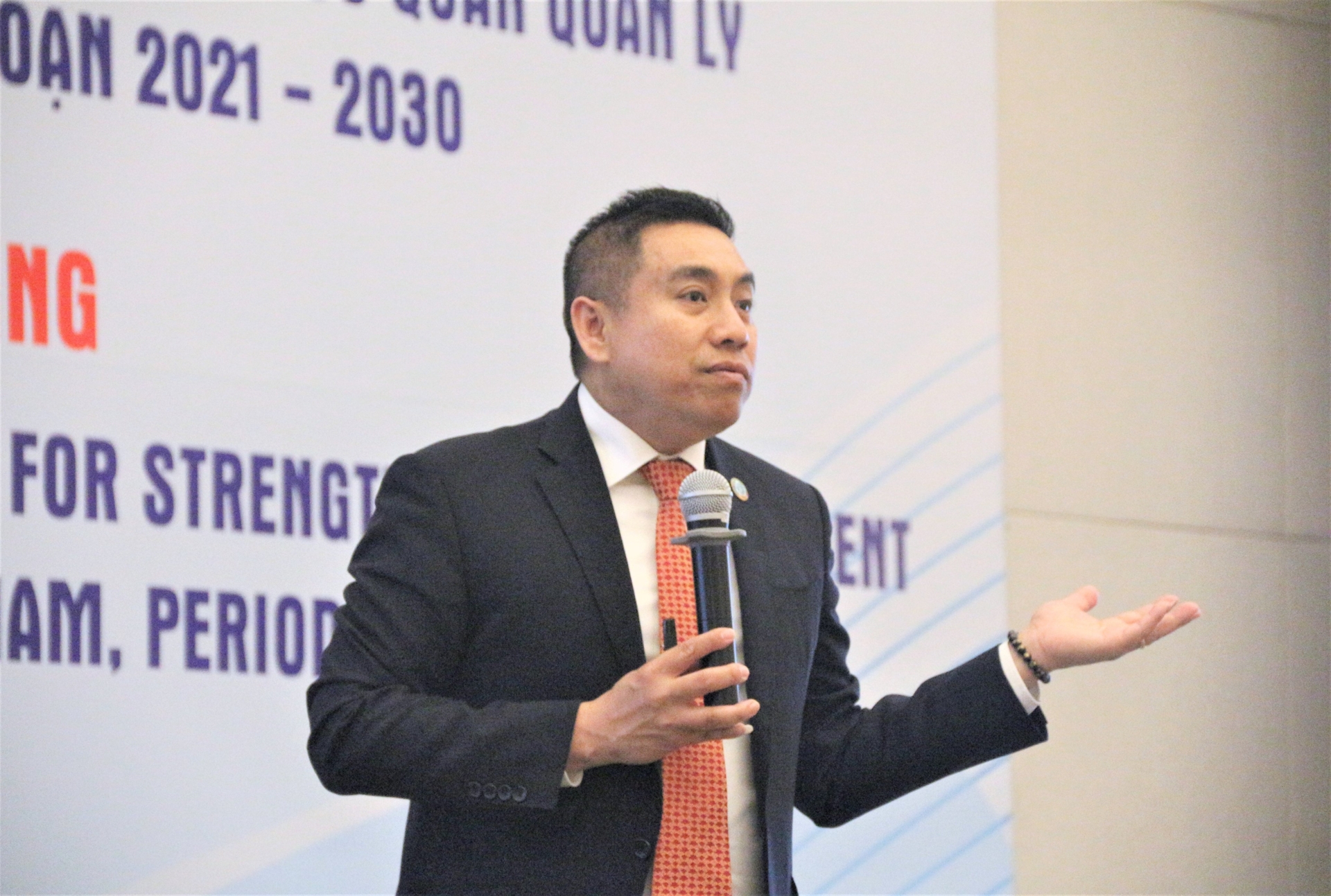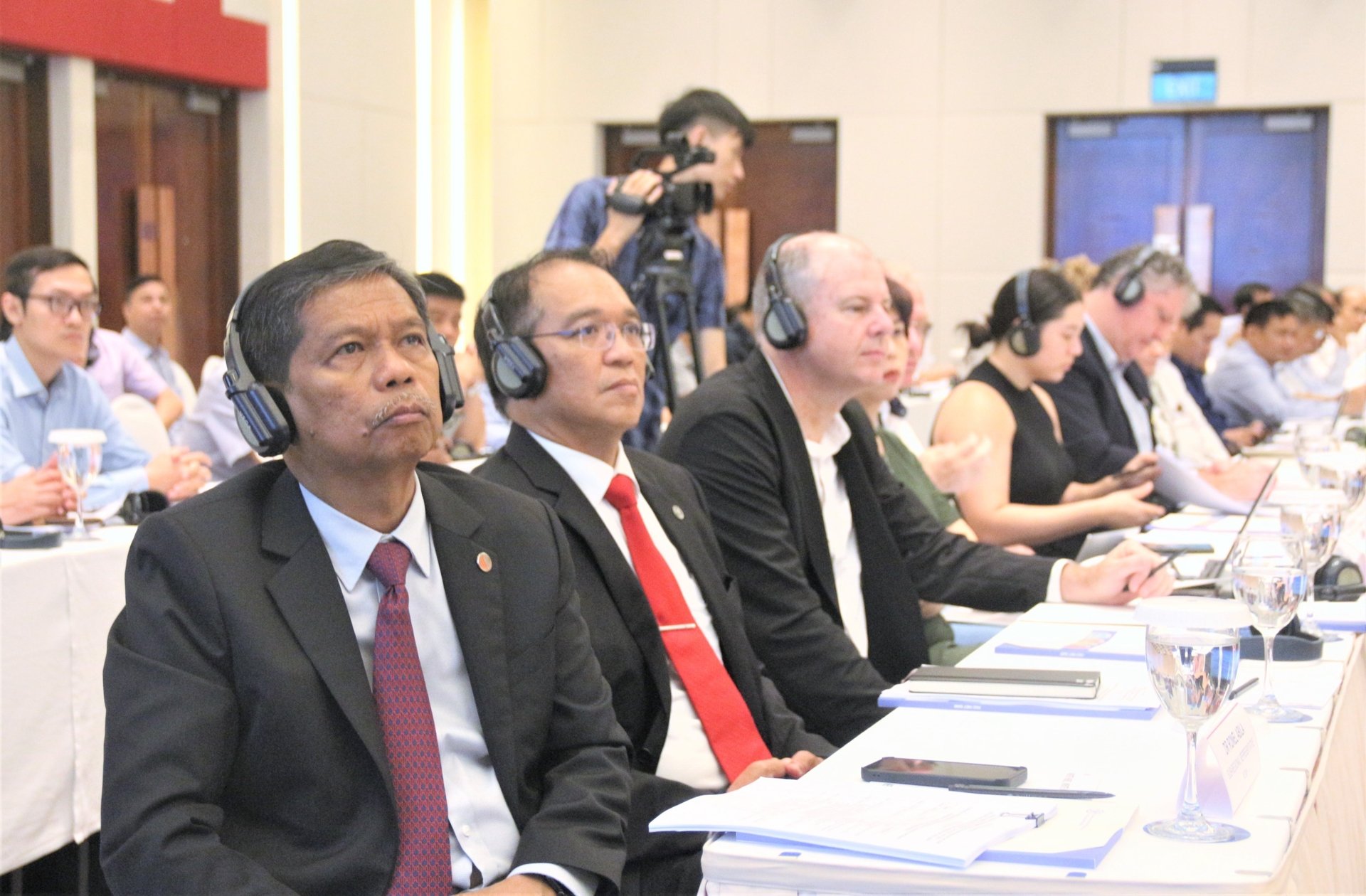November 28, 2025 | 01:52 GMT +7
November 28, 2025 | 01:52 GMT +7
Hotline: 0913.378.918
November 28, 2025 | 01:52 GMT +7
Hotline: 0913.378.918

Mr. Thanawat Tiensin, Director of the Animal Production and Health Division (NSA) at the Food and Agriculture Organization (FAO) shared at the meeting.
Mr. Thanawat Tiensin, Director of the Animal Production and Health Division (NSA) at the Food and Agriculture Organization (FAO) started the first statement in the "Consultation meeting to support the implementation of the roadmap for strengthening the management capacity of Vietnam's services in Vietnam, 2021-2030".
During his tenure, Mr. Tiensin emphasized the crucial role of veterinary professionals in promoting sustainable development of livestock production and implementing the One Health approach.
With the world's population on the rise and a growing demand for animal-based food, Tiensin has posed the question of how we can maintain feeding for humans on this planet. "How to feed all humans on the planet?" he asks, as we face the challenge of balancing our needs with those of the environment and the animals we rely on for food.
According to estimates, the world's population is anticipated to approach nearly 10 billion individuals by the year 2050. According to recent estimates, the worldwide demand for animal-based food items such as meat, eggs, and dairy is expected to rise by 20 percent by the year 2050. Animal-source foods such as meat, eggs, and dairy are crucial in promoting healthy and sustainable diets worldwide. According to Tiensin's report, the environmental impacts of livestock production can be viewed from various angles.
In the last three decades, there has been a significant surge in the demand for animal source foods in Asia. According to industry experts, the growth trend for animal food products is predicted to stabilize between 2020 and 2050. However, it is projected that Asia will be the primary driver of demand for these products over the next three decades.
Africa is anticipated to experience a significant rise in the demand for animal-based food products by 2050. However, this increase is predicted to be at a lower overall level in comparison to other regions. According to recent reports, the level of demands in Europe is expected to remain stable for the next three decades. The demand for this product is anticipated to keep increasing in the Americas.
The issue of food security has become increasingly pushing as recent statistics reveal a concerning trend. Hunger rates have risen, with 149.2 million children (equivalent to 22% of the global child population) experiencing stunted growth. Additionally, there are now 2 billion people who are classified as overweight or obese, while the same number lack essential micronutrients. Furthermore, 2 billion individuals do not have access to a healthy diet, highlighting the urgent need for action to address this critical issue. Despite efforts to improve global nutrition, several goals, including reducing anemia and stunting, have yet to be achieved.

International delegates attend the meeting.
As the global population continues to grow, the world is turning its attention to improving agricultural output in order to ensure food security. This shift is part of a larger effort to transform the agriculture system.
The livestock industry has faced a multitude of challenges due to the growing consumption of animal-source foods from various countries. The movement has gained significance due to the detection and spread of various trans-boundary diseases such as African Swine Fever and Foot and Mouth Disease across borders. Livestock production in Asia and Africa has seen significant growth, but certain developing nations have failed to implement and promote synchronized biosafety measures for livestock production and environmental sanitation solutions.
The livestock industry is dealing with a multitude of challenges, including the European Union's mandate to combat deforestation in the production of agricultural goods, instances of commercial fraud, and the pervasive issue of antibiotic resistance. These challenges are particularly daunting for small-scale farmers.
Livestock production is being called upon to adopt more sustainable practices that have a reduced impact on the environment. Livestock farmers have been advised to prioritize low-emission farming practices while also maintaining high standards of biosecurity and safety. The implementation of these requirements could potentially have a positive impact on the livelihoods of farmers, particularly those in rural areas. Additionally, it may help to ensure the safety of food for consumers in the long term. Biodiversity is expected to remain unaffected with regard to the environment.
Livestock production must be restructured due to its significant contribution to greenhouse gas emissions, which poses a challenge to achieving sustainable development goals. This is particularly important as rice farming and livestock production have been identified as major contributors to these emissions.
Vietnam's livestock industry is reported to remain small and fragmented, as stated by Mr. Tiensin. The expert suggested the need for a bold action plan at the national level to synchronize all the tasks and targets mentioned.
As per Tiensin, the goal of the meeting is to advance sustainable livestock production, not just on a worldwide scale, but also at the community level. Tiensin expressed his concern about the challenge of improving people's lives through job creation and higher income while using fewer resources.
A representative of the Food and Agriculture Organization (FAO) has put forward potential solutions to overhaul the livestock industry and strengthen veterinary systems, drawing on their experience in Thailand. The creation of a worldwide initiative involving multiple stakeholders is deemed crucial. A call has been made for the development of a roadmap, framework, or set of best practices that can be applied to the livestock industry across all countries. Efforts are being made to develop policies at the national level that will encourage foreign direct investment (FDI) and attract the attention of foreign enterprises to the sector.

(VAN) On November 27, in the meeting with Minister Tran Duc Thang, Mayor Yin Yong shared Beijing’s experience to improve environment and air quality.

(VAN) After 30 years, both sides identified strategic areas of cooperation: sustainable production, increasing coffee value and training for farmers.
/2025/11/27/4910-4-164708_294.jpg)
(VAN) On the afternoon of November 27 in Beijing, Minister of Agriculture and Environment Tran Duc Thang held a working session with several major Chinese enterprises operating in the agriculture and environment sector.

(VAN) The Department of Animal Health issued a provisional guideline requesting local authorities to increase surveillance, collect samples for testing, and conduct epidemiological investigations according to the established procedure.

(VAN) The United Nations recommends that Vietnam utilize data and artificial intelligence to enhance early disaster warnings and reduce GDP losses by 3.2% in the context of climate change.

(VAN) On the morning of November 27 in Beijing, Minister Tran Duc Thang and the Deputy Commissioner General of the General Administration of Customs of China signed a protocol on fresh jackfruit exports.

(VAN) As floodwaters recede, a vast network of irrigation works across eastern Gia Lai is emerging in a state of severe disrepair, with extensive damage demanding urgent restoration ahead of the 2025-2026 winter-spring cropping season.